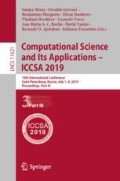Abstract
In this paper, we address the portfolio selection problem and solve it by means of a machine learning approach. More precisely, we study portfolio optimization under cardinality constraint, which limits the number of assets in a portfolio. This problem is known to be NP-hard and, consequently, difficult to solve for some settings of the cardinality parameter. In order to solve the problem, we introduce a hybrid approach that combines effectively an existing bandit learning algorithm with a kernel search heuristic. The bandit learning algorithm is used for conducting online portfolio selections and the kernel search manages the cardinality constraint. In order to investigate the performance of our algorithm, we carried out computational experiments on real-world market data sets. According to the numerical results, we observe that, despite the presence of cardinality constraint, our hybrid algorithm shows good performance in solving the test instances in reasonable computation time and, in many cases, the algorithm provides portfolios with higher cumulative wealth than those obtained through the existing bandit learning algorithm, which is applied on classical portfolio selection problem.
Access this chapter
Tax calculation will be finalised at checkout
Purchases are for personal use only
References
Bartholomew-Biggs, M.C.: Nonlinear Optimization with Financial Applications, 1st edn. Kluwer Academic Publishers, Dordrecht (2005)
Berry, D.A., Fristedt, B.: Bandit Problems: Sequential Allocaton of Experiments. University of Minnesota: Chapman and Hall Ltd., London (1985)
Chen, W., Wang, Y., Yuan, Y.: Combinatorial multi-armed bandit: general framework and applications. In: Proceedings of the 30th International Conference on Machine Learning, pp. 151–159 (2013)
Fan, J., Fan, Y., Lv, J.: High dimensional covariance matrix estimation using a factor model (2007). http://arxiv.org/pdf/math/0701124v1
Fernández, A., Gómez, S.: Portfolio selection using neural networks. Comput. Oper. Res. 34, 1177–1191 (2007)
Guastaroba, G., Speranza, M.G.: Kernel search: an application to the index tracking problem. Eur. J. Oper. Res. 217(1), 54–68 (2012)
Gulpinar, N., Le Thi, H.A., Moeini, M.: Robust investment strategies with discrete asset choice constraints using DC programming. Optimization 59(1), 45–62 (2010)
Hoffman, M.D., Brochu, E., de Freitas, N.: Portfolio allocation for bayesian optimization. In: The Conference on Uncertainty in Artificial Intelligence, pp. 327–336 (2011)
Jobst, N., Horniman, M., Lucas, C., Mitra, G.: Computational aspects of alternative portfolio selection models in the presence of discrete asset choice constraints. Quant. Finance 1, 1–13 (2001)
Konno, H., Yamamoto, R.: Global optimization versus integer programming in portfolio optimization under nonconvex transaction costs. J. Glob. Optim. 32, 207–219 (2005)
Lai, T.L., Robbins, H.: Asymptotically efficient adaptive allocation rules. Adv. Appl. Math. 6(1), 4–22 (1985)
Le Thi, H.A., Moeini, M.: Portfolio selection under buy-in threshold constraints using DC programming and DCA. In: International Conference on Service Systems and Service Management (IEEE/SSSM 2006), pp. 296–300 (2006)
Le Thi, H.A., Moeini, M., Pham Dinh, T.: Portfolio selection under downside risk measures and cardinality constraints based on DC programming and DCA. Comput. Manag. Sci. 6(4), 477–501 (2009)
Le Thi, H.A., Moeini, M., Pham Dinh, T.: DC programming approach for portfolio optimization under step increasing transaction costs. Optimization 58(3), 267–289 (2009)
Le Thi, H.A., Moeini, M.: Long-short portfolio optimization under cardinality constraints by difference of convex functions algorithm. J. Optim. Theory Appl. 161(1), 199–224 (2014)
Markowitz, H.M.: Portfolio selection. J. Finance 7(1), 77–91 (1952)
Markowitz, H.M.: Portfolio Selection. Wiley, New York (1959)
Meucci, A.: Risk and Asset Allocation. Springer, Dordrecht (2009)
Moeini, M., Wendt, O., Krumrey, L.: Portfolio optimization by means of a \(\chi \)-armed bandit algorithm. In: Nguyen, N.T., Trawiński, B., Fujita, H., Hong, T.-P. (eds.) ACIIDS 2016. LNCS (LNAI), vol. 9622, pp. 620–629. Springer, Heidelberg (2016). https://doi.org/10.1007/978-3-662-49390-8_60
Robbins, H.: Some aspects of the sequential design of experiments. Bull. Am. Math. Soc. 58, 527–535 (1952)
Shen, W., Wang, J., Jiang, Y.-G., Zha, H.: Portfolio choices with orthogonal bandit learning. In: Proceedings of the Twenty-Fourth International Joint Conference on Artificial Intelligence (IJCAI 2015), pp. 974–980 (2015)
Thompson, W.R.: On the likelihood that one unknown probability exceeds another in view of the evidence of two samples. Biometrika 25, 275–294 (1933)
Acknowledgments
The author wishes to thank the Chair of Business Information Systems and Operations Research (BISOR) at the Technische Universität Kaiserslautern (Germany), where the paper was written, for the financial support.
Author information
Authors and Affiliations
Corresponding author
Editor information
Editors and Affiliations
Rights and permissions
Copyright information
© 2019 Springer Nature Switzerland AG
About this paper
Cite this paper
Moeini, M. (2019). Orthogonal Bandit Learning for Portfolio Selection Under Cardinality Constraint. In: Misra, S., et al. Computational Science and Its Applications – ICCSA 2019. ICCSA 2019. Lecture Notes in Computer Science(), vol 11621. Springer, Cham. https://doi.org/10.1007/978-3-030-24302-9_17
Download citation
DOI: https://doi.org/10.1007/978-3-030-24302-9_17
Published:
Publisher Name: Springer, Cham
Print ISBN: 978-3-030-24301-2
Online ISBN: 978-3-030-24302-9
eBook Packages: Computer ScienceComputer Science (R0)

